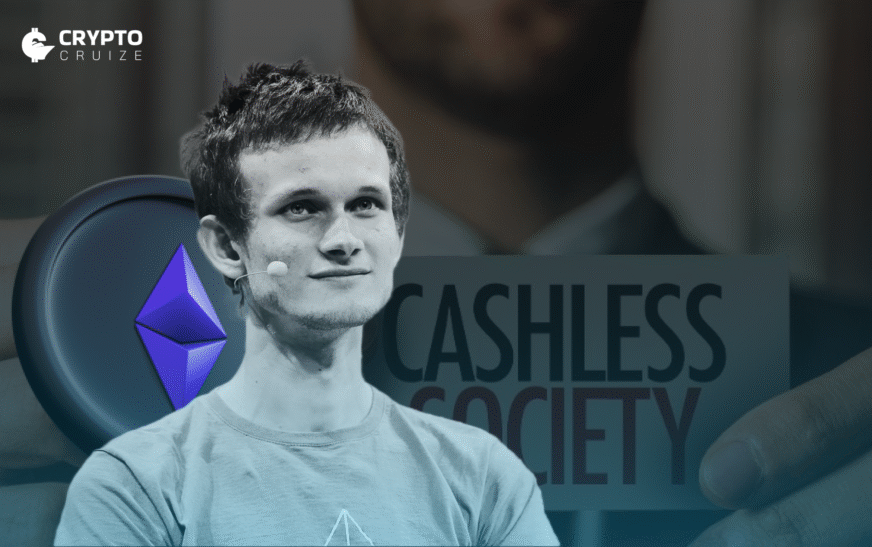As Sweden reconsiders its near-total shift towards a cashless society, Ethereum co-founder Vitalik Buterin has weighed in on the issue, highlighting the risks of centralised digital payment systems and advocating for decentralised alternatives such as Ethereum.
Sweden’s Digital Drive Meets a Reality Check
For years, Sweden has been seen as a pioneer in the move towards a cashless economy, with digital transactions dominating daily life. As of 2025, only one in ten transactions in the country are done using cash. A 2018 prediction from a former central bank official stating that Sweden would be fully cashless within seven years has largely proven accurate.
However, this shift has raised fresh concerns around national security, cyber threats, and resilience during times of instability. These concerns have prompted a reversal in the country’s policy direction. The Swedish government has now issued guidelines encouraging citizens to keep at least a week’s worth of cash on hand in case of emergencies, such as war or power outages.
Buterin: Centralised Systems Too Fragile
Commenting on Sweden’s change in stance, Vitalik Buterin pointed to the limitations of centralised digital payment systems. In a post referencing a 16 March article from The Guardian, Buterin said, “Nordics are walking back the cashless society initiative because their centralised implementation of the concept is too fragile. Cash turns out to be necessary as a backup.”

He argued that while centralised systems may offer efficiency and convenience, they often lack the robustness required to withstand crises. This, he suggested, is where decentralised platforms like Ethereum could offer an alternative.
Ethereum as a Financial Fallback in Crises
Buterin proposed that Ethereum could act as a decentralised financial fallback during emergencies. According to him, Ethereum must be both resilient and private enough to “credibly play this kind of role” in times of instability.
The idea is to enable financial transactions even in the absence of the internet or mobile networks. When asked whether private, fully offline payments powered by zero-knowledge technology were nearing practical implementation, Buterin responded positively but noted that current solutions still have caveats.
“We basically know how to do it,” he said, “but with the limitation that any solution depends on trusted hardware and/or post hoc enforcement against double-spenders.”
Trusted hardware refers to secure computing environments that can operate independently of internet access. However, these technologies still require more development and broader accessibility before they can be deployed at scale.
Crypto and Fiat: A Coexistence, Not a Replacement
Despite growing interest in decentralised payment systems, industry experts believe cryptocurrencies will not completely replace fiat currencies. Petr Kozyakov, CEO and co-founder of crypto payments firm Mercuryo, acknowledged the rising demand for crypto-based transactions but maintained that fiat currencies are here to stay.
“Crypto payments are definitely seeing increased adoption,” Kozyakov said in a recent interview. “But rather than cryptocurrencies overtaking fiat money, what we’re likely to see is a coexistence. People will use crypto when it’s easier and more practical.”
This suggests that while crypto can provide an effective alternative in certain contexts, especially in scenarios where traditional banking infrastructure is compromised, it is unlikely to entirely supplant established financial systems in the foreseeable future.
A Wake-Up Call for Digital-Only Economies
Sweden’s reconsideration of a fully cashless economy has brought wider attention to the vulnerabilities inherent in centralised financial infrastructure. While digital payment systems continue to expand globally, the Swedish case serves as a reminder of the importance of maintaining redundancy and resilience.
Vitalik Buterin’s remarks underscore the potential role that blockchain and decentralised technologies can play in bolstering financial systems during emergencies. As global tensions rise and cybersecurity threats become more sophisticated, governments and citizens alike may begin to place greater emphasis on fallback options, both analogue and decentralised.
Ethereum, with its evolving ecosystem and focus on privacy-enhancing features, could become a critical part of this shift. However, practical implementation will require overcoming technical and logistical challenges, particularly in ensuring trust and preventing fraud in offline environments.
For now, the conversation around the future of payments appears to be shifting from the convenience of digital to the necessity of resilience.




















































